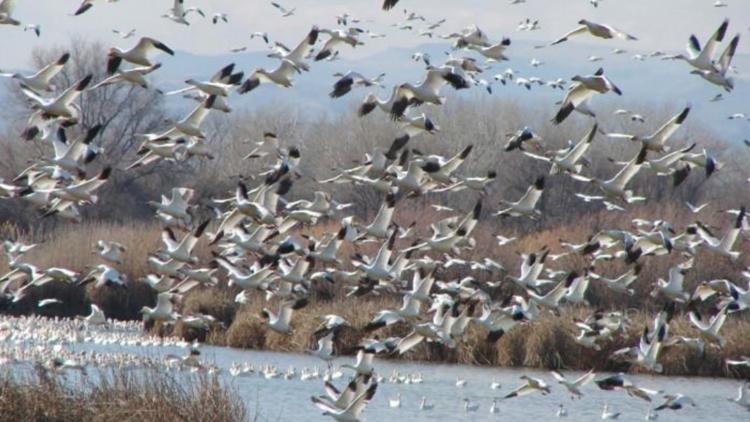BOISE, Idaho — This story originally appeared in the Idaho Press.
Thousands of wild birds have died recently in the Treasure Valley because of avian flu, the Idaho Department of Fish and Game announced Wednesday.
The sick and dead birds, namely geese, have been reported in the Lake Lowell, Parma, and Fort Boise areas, the department said, adding that Fish and Game staff are actively working to pick up carcasses of birds in areas with the largest number of dead waterfowl.
Avian influenza is carried primarily by waterfowl (geese and ducks) along their migratory paths from their summer habitat to their wintering grounds, Fish and Game said, noting that mortality events like the one occurring in Idaho are often widespread.
“Groups of dead light geese – which include blue, snow, Ross’s geese – have been discovered as far east as Indiana and Tennessee and as far south as Louisiana and Texas,” Fish and Game Migratory Game Bird Coordinator Jeff Knetter said. “While unfortunate, several thousand light geese dying in a mortality event does not present population level concerns; the number of birds impacted is a very small proportion of the overall population which exceeds a million birds.”
The disease must run its course, as there is no treatment or vaccine for avian influenza, Fish and Game said, adding that department personnel are not able to respond to every report of infected birds. However, the public is asked to report sick or dead wild bird observations on Fish and Game’s website, idfg.idaho.gov, to assist avian influenza surveillance efforts.
Additionally, live birds showing signs of illness should be left alone, as moving sick birds may further spread the disease, Fish and Game said. The department also said that local wildlife rehabilitation centers are not currently accepting wild birds.
Dead birds can be disposed of in the trash to ensure other animals do not contact or consume them, Fish and Game said, adding that the best practice when handling the birds is to use gloves and a mask, and place them in a double-bagged trash bag. People should also make sure to wash their hands after handling birds.
Fish and Game noted that domestic birds and poultry are very susceptible to dying once exposed to avian influenza, which is transmitted between birds through close contact (mucous), fecal matter, and sometimes through the air. It is also carried on objects such as tools, vehicles, clothes, and boots, which can transfer the virus from one location to another. The Idaho State Department of Agriculture (ISDA) is the agency to contact if concerns arise regarding commercial or backyard poultry.
Bird flu viruses do not normally infect humans, according to the U.S. Centers for Disease Control and Prevention, but sporadic human infections do occur. Symptoms may include conjunctivitis, fever, lethargy, aches, coughing, or diarrhea.
For more stories from the Idaho Press, click here.



